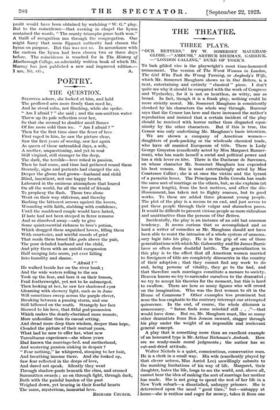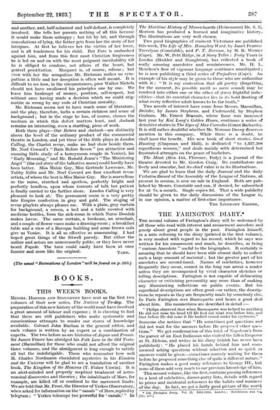THE THEATRE.
THREE PLAYS.
"OUR BETTERS," BY W. SOMERSET MAUGHAM• GLOBE.—" AMBUSH," ARTHUR RICHMAN, GARRICK. —"LONDON CALLING," DUKE OF YORK'S.
To lash gilded vice is the playwright's most time-honoured amusement. The version of The Worst Woman in London, The Girl Who Took the Wrong Turning, or Anybody's Wife, which Mr. Somerset Maugham shows us in Our Betters, is a neat, entertaining and entirely " classical " piece. I don't
quite see why it should be compared with the work of Congreve and Wycherley, for it is not so heartless, so witty, nor so broad. In fact, though it is a frank play, nothing could be more strictly moral. Mr. Somerset Maugham is consistently shocked by his characters the whole way through. Rumour says that the Censor has here and there increased the author's reprobation and insisted that a certain incident of the play should be received with horror rather than disgusted equa- nimity by the other characters. But if this is true, the Censor was only underlining Mr. Maugham's basic intention.
We are shown a company of American women— daughters of pork-packing or the wholesale chemical trade, who have all married Europeans of title. There is Lady George Grayston (excellently acted by Miss Margaret Banner- man), who has made herself a social and political power and has a rich lover en titre. There is the Duchesse de Surennes„ on whose character Mr. Somerset Maugham has expended his best venom. She is most entertainingly acted by Miss Constance Collier ; she is at once the victim and the tyrant of a parasitic lover. The Principessa Della Cercola has made the same sort of marriage as the others, but, as she explains (at too great length), from the best motives, and after the dis- illusionment, has taken not to flighty courses, but to good works. To these are added three pleasant young people. The plot of the play is a means to an end, and just serves to put these people through their vulgar and shameless paces. It would be difficult to present vicious people as more ridiculous and unattractive than the persons of Our Betters.
Incidentally, the play is an instance of an odd but common tendency. It seems curious that so accomplished and so hard a writer of comedies as Mr. Maugham should not have been able to resist the intrusion of a whole system of unneces- sary logic into his play. He is in the grip of one of those generalizations with which Mr. Galsworthy and Sir James Barrie have so often done doubtful battle. The generalization in this play is to the effect that all American women married to foreigners of title are completely desoeuznies in the country of their adoption ; that they cannot find any work to do and, being persons of vitality, they go to the bad, and that therefore such marriages constitute a menace to society. Heaven knows we try to surrender ourselves to the dramatist ; we try to accept his theories for the moment, but this is hard to swallow. There are here so many figures who will crowd on the imagination. Who was the first woman to sit in the House of Commons ? Other examples less prominent but none the less emphatic to the contrary interrupt our attempted quiescence. In the end, of course, the whole dilemma is unnecessary. " Satan finds some mischief still . . ."—that would have done. But no, Mr. Maugham must, like so many other dramatists from Ben. Jonson onward, stagger through his play under the weight of an impossible and irrelevant general concept.
A play that is something more than an excellent example of an honoured type is Mr. Arthur Richman's Ambush. Here are no ready-made moral judgments ; the author has no cut-and-dried attitude.
Walter Nichols is a quiet, conscientious, conservative man. He is a clerk in a small way. His wife (excellently played by that clever actress, Miss Auriol Lee) unwillingly submits to the numbing limitations of his way of life. Margaret, their daughter, hates the life, longs to see the world, and, above all, cannot bear the idea of making the sort of marriage her mother has made. She is not going to spend the rest of her life in a New York suburb—a dissatisfied, unhappy prisoner. She is determined upon the usual- " good time," but—unhappy at home—she is restless and eager for money, takes it from one
and another, and, half-ashamed and half-defiant, is completely involved. She tells her parents nothing of all this because it would make them unhappy ; but bit by bit, and through convolutions of lying, the father gets from her the story of her intrigues. At first he believes her the victim of her lover, and is all tenderness for his child. But Fate is ambushed against him, and from this first most Christian forgiveness he is led on and on with the most poignant inevitability till he is obliged to condone, not affairs of the heart, but genteel prostitution. Margaret is, of course, odious ; but even with her the scrupulous Mr. Richman makes us sym- pathize a little and her deception is often well meant. It is difficult to see how, in the circumstances, poor Walter Nichols should not have swallowed his principles one by one. We leave him bankrupt of money, position, self-respect, but without once having made a decision which we could stig- matize as wrong by any code of Christian morality.
Mr. Richman seems not to have much sense of literature, and the play, therefore, lacks a certain richness and sense of background ; but in the stage he has, of course, chosen the medium in which this defect matters least, and Ambush remains an interesting, even a startling, piece of work.
Both these plays—Our Betters and Ambush—are distinctly above the level of the ordinary product of the commercial theatre in London, and yet three of the little plays in London Calling, the Chariot revue, make no bad show beside them. Mr. Noel Coward's " Rain Before Seven " (an attractive and amusing little study of a honeymoon couple in Venice), his "Early Mourning," and Mr. Ronald Jeans's "The Ministering Angel " (the sad story of the talkative nurse) could hardly have been better. Miss Maisie Gay, Miss Gertrude Lawrence, Mr. Tubby Edlin and Mr. Noel Coward are four excellent revue artists, of whom the best is Miss Maisie Gay. She is marvellous as the nurse, starched and spotless, perfectly bright and perfectly headless, upon whose torrents of talk her patient is finally carried to the further shore. London Calling is very pleasant to look at: The permanent scene is a very pretty late Empire confection in grey and gold. The staging of revue .playlets always pleases me. With a plain, grey curtain for background, a screen, a bed and a table covered with' medicine bottles, form the sick-room in which Nurse Doodah makes havoc. The same curtain, a bookcase, an armchair, and a couple of flower vases make a drawing-room ; a breakfast table and a view of a Baroque building and some brown sails give us Venice. It is all as effective as unassuming. I had hoped great things of the Sitwell parody. But either the author and actors are unnecessarily polite, or they have never heard Facade. The turn could easily have been at once
funnier and more like the original. TARN.







































 Previous page
Previous page